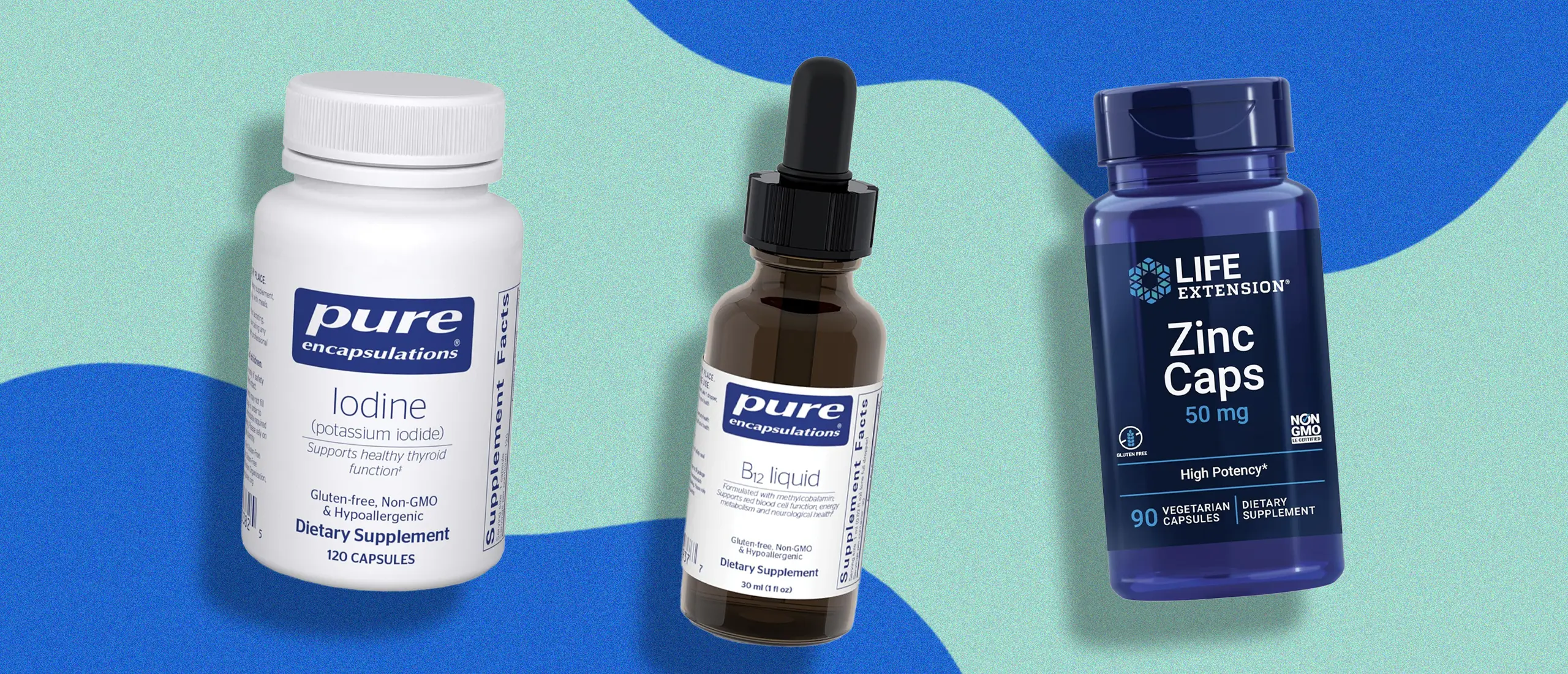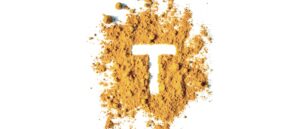The Best Thyroid Supplements, According to RDs
- By Karla Walsh
- April 9, 2024
Our product recommendations are selected by editors, tested first-hand, or expert-approved. We may earn a commission through links on our site.
The thyroid, a small, butterfly-shaped gland located in the front of your neck, is a workhorse member of your hormone-producing endocrine system (1). This small but mighty gland plays a big role in metabolism, energy levels, and hormone regulation—and it needs certain nutrients to function properly. If you’re deficient in any of them, taking a supplement can help, which is why we asked two registered dietitians to identify the best thyroid supplements.
Although we don’t see many splashy news headlines about it, thyroid conditions are surprisingly common. Nearly 12 percent of Americans develop a thyroid disease during their lifetime, the bulk of which are women (females are five to eight times more likely to have thyroid issues) though they crop up in men, too (2).
Yet, an estimated 60 percent of those with thyroid conditions are walking around undiagnosed (2), so it’s important to schedule regular check-ups with your doctor and get the right tests done to screen for the two most common thyroid diseases: Hypothyroidism and hyperthyroidism.
If your thyroid isn’t cranking out enough hormones, you have hypothyroidism (3). TSH is secreted by the pituitary gland, and levels of it are often high in people with hypothyroidism. This can indicate that the gland isn’t producing enough thyroid hormone (which consists of both T3 and T4). Hyperthyroidism occurs when you have an overactive thyroid (4). Blood labs will reveal a low level of TSH, which suggests too much of the T4 is being produced to try to balance things out.
Ahead, find out which vitamins and minerals can help support thyroid health—and which supplements to skip.
About the Experts
Lisa Andrews, MEd, R.D., a Cincinnati, Ohio-based registered dietitian nutritionist at Health Insiders, a company that reviews supplements and other wellness-related products
Vivian Yu, R.D.N., a Victoria, Australia-based registered dietitian nutritionist and founder of Gym Near Me who helps people find better balance in all areas that relate to wellness, including hormones.
What Are Thyroid Supplements?
If you’re diagnosed with a thyroid disorder, there are several medications your doctor can prescribe to help shift the hormone seesaw back in balance (5). You can also consider taking a handful of supplements that have been shown to support thyroid health.
“Replacing certain nutrients will not necessarily prevent issues with thyroid function,” says Andrews. However, if you’re deficient in any of the below vitamins and minerals, taking a supplement could help you manage your symptoms—especially if you’re already taking medication.
The Best Thyroid Supplements
If blood tests reveal you’re low in the following nutrients, ask your doctor if one of these thyroid supplements might complement your prescribed medications.
Iodine
Your thyroid relies on iodine to produce T3 and T4, Andrews explains. Iodine is found in iodized salt, processed food, as well as seafood, dried fruit, dairy products, and vegetables (6). Vegans, those who are pregnant, and those who don’t consume iodized salt are at greater risk for deficiency than the average person.
Too much iodine can negatively impact thyroid function and introduce new hormonal issues, research suggests (7), so be sure to work with your doctor to check your levels regularly to aim for the sweet spot; not too much and not too little.
Choose this supplement:
Zinc
In addition to bolstering the immune system,“both zinc and selenium are needed to convert thyroid hormone into its active form (9),” Andrews explains. (That T3 we mentioned? It’s the “active form,” which means it affects cells in your body. T4 is considered “inactive” since it’s the stored form of thyroid hormone that can be converted to, and used as, T3.)
The best food sources of zinc include dairy products, mushrooms, peas, spinach, whole grains, nuts and seeds, beans, and lentils (10).
Keep in mind that high doses of zinc can interfere with the absorption of copper. Copper deficiencies are nothing to glaze over; they can trigger neurological symptoms like numbness and weakness in the arms and legs (11). It’s wise to keep in conversation with your doctor and check your levels often if you choose to supplement.
Choose this supplement:
Vitamin D
Vitamin D is a fat-soluble vitamin that also acts as a hormone in the body, Andrews says. It’s best known for supporting calcium absorption, but vitamin D (specifically, Vitamin D3, which is actually a hormone) is also needed for normal thyroid function, (13, 14).
“Vitamin D helps protect against autoimmune thyroid issues,” Yu says. Autoimmune conditions that affect the thyroid include Grave’s disease and Hashimoto’s thyroiditis, which cause hyperthyroidism and hypothyroidism, respectively (15, 16). Vitamin D, specifically D3, can help the immune system recognize that the thyroid is not the enemy, and can help control the antibodies from attacking the gland (17).
The best food and drink sources of vitamin D include fatty fish, fortified milk and other dairy and non-dairy products such as fortified orange juice, plus mushrooms grown under UV light (13). Our bodies obtain vitamin D from casual sun exposure as well, which the liver and kidneys convert to the active form of D3. In darker times of the year especially, sun exposure is unlikely to make a substantial difference—especially if you’re wearing SFP (18).
An estimated 25 percent of Americans are deficient in vitamin D, research suggests (19), but too much vitamin D can cause loss of appetite, excessive thirst and urination, dehydration, nausea, muscle weakness, confusion, and kidney stones.
Choose this supplement:
Vitamin B12
Vitamin B12 comes in clutch when it comes to keeping your nervous system healthy, boosting energy, producing red blood cells, and synthesizing DNA (20). Deficiencies are common among those with hypothyroidism (21), though the scientific jury is still out about why
Since vitamin B12 is only found in animal products (meat, fish, poultry, pork, and eggs are strong sources) or foods that have been enriched with it, vegetarians and vegans are at a higher risk for deficiency, says Andrews.
Choose this supplement:
Selenium
Andrews previously mentioned that selenium (an essential mineral) is needed to convert T4 into its active form T3. If you have deficiency in selenium, that can cause a major disruption in thyroid hormone conversion. Specifically, T4 levels will be greater than T3 levels (22).
Many foods contain selenium, with the richest sources including Brazil nuts, tuna, sardines, ham, shrimp, beef, chicken, and brown rice (23). However, keep in mind that selenium supplement may only be beneficial if you have deficiency in the mineral. That’s because it’s really easy to dip into the toxicity territory—according to the National Institutes of Health, the tolerable upper intake level for selenium is 400 micrograms (mcg) (23).
If your selenium levels become too high, you may notice certain symptoms, including brittle hair and nails, nausea, skin rashes, fatigue, and nervous system abnormalities. Toxicity can manifest in many ways too, such as severe gastrointestinal distress, kidney failure, and lightheadedness (23).
Choose this supplement:
Factors to Consider When Choosing a Thyroid Supplement
Supplements aren’t FDA regulated, so look for something that’s third-party tested.
“This means an outside agency has independently tested the supplement for quality and safety and validates that the product contains the ingredients listed on its label,” says Andrews.
Third-party tested supplements will include a seal of approval from an organization like National Sanitation Federation (NSF), which tests ingredients in supplements for harmful levels of contaminants (24). This helps to ensure products are toxin-free and safe for consumers.
How much should you take? “Most supplements should not exceed 100 percent of the RDA, but more of a supplement is sometimes needed when a deficiency exists,” says Andrews. Ask your doctor how much they suggest based on your nutrient levels.
Beyond that, seek out thyroid supplements from reputable brands, and if you follow a specific diet (vegan or gluten-free, for instance) or have any allergies (to items like soy, wheat, or dairy), be sure to analyze the label to find the best thyroid vitamin and mineral supplements for you.
Avoid supplements marketed as “Thyroid Support”
According to the American Thyroid Association (ATA), products marketed as combination “thyroid support” supplements are often marketed to promote weight loss or increase energy, however, many of these contain an amalgamation of vitamins, minerals, and sometimes herbs and other active ingredients in unknown or very large quantities (25).
The thyroid relies on a delicate balance, and taking too much of some of these combo nutrients can actually cause hyperthyroidism, the ATA notes. Steer clear.
How Else Can You Support Your Thyroid Health?
Start with knowing your family history, since thyroid conditions are hereditary, Andrews says.
Beyond that, the following lifestyle strategies have been shown to support thyroid health:
Avoid fad diets
“Fad diets often remove entire food groups, which raises the risk of excess or deficiencies in your nutritional intake, including vitamins, minerals, antioxidants, and fiber,” Andrews says. (This includes the potential for deficiencies in the aforementioned vitamins and minerals for the thyroid.)
Plus, research suggests that about 20 to 25 percent of fad diets might progress into full-blown eating disorders, which raise the risk of thyroid dysfunction (26, 27).
Don’t smoke and limit alcohol
This means two (or fewer) drinks per day for men and one drink (or less) per day for women. Anything beyond that can affect TSH levels, research suggests (28). According to the National Institute on Alcohol Abuse and Alcoholism, “one standard drink” equals: 12 ounces beer (5% alcohol by volume, or ABV), 5 ounces wine (12% ABV), or 1 ½ ounces spirits (40% ABV) or a cocktail made with that amount (29).
Smoking has been shown to decrease TSH and increase T3 and T4 (30).
Prioritize sleep
Poor sleep may disrupt circadian rhythm and thyroid function (31). Aim for 7-8 hours per night to help maintain a normal metabolism, says Andrews.
Move your body
Regular exercise as well as mindfulness practices like yoga and meditation result in lower levels of the hormone cortisol; high levels of which have been linked to abdominal weight gain. Weight management plays a role in thyroid function (32, 33, 34).
So, what’s happening inside your body when your thyroid is out of whack?
“Your thyroid works with your pituitary gland, which makes thyroid stimulating hormone (TSH). The small pituitary gland lives inside your brain and tells your thyroid to make and release hormones,” says Andrews. (For context, your thyroid also communicates with other glands and hormones in the body.)
If, for some reason, your thyroid becomes damaged, the production of thyroid hormones is impacted, she adds. “When TSH is off balance, too much or too little of various hormones are made, which results in changes in metabolism.”
References
1. Institute for Quality and Efficiency in Health Care (IQWiG): How does the thyroid gland work?
2. American Thyroid Association (ATA). General Information.
3. American Thyroid Association (ATA). Hypothyroidism.
4. American Thyroid Association (ATA). Hyperthyroidism.
5. American Thyroid Association (ATA). Brand and Generic Medication Explained.
6. National Institutes of Health (NIH) Office of Dietary Supplements. Iodine Fact Sheet for Health Professionals.
7. Jessica Farebrother, et al (2019). Excess iodine intake: sources, assessment, and effects on thyroid function.
8. Pure Encapsulations. Frequently Asked Questions.
9. Jéssica Batista Beserra, et al (2021). Relation Between Zinc and Thyroid Hormones in Humans: a Systematic Review.
10. National Institutes of Health (NIH) Office of Dietary Supplements. Zinc Fact Sheet for Health Professionals.
11. Zola Francis, MD, et al (2022). The COVID-19 Pandemic and Zinc-Induced Copper Deficiency: An Important Link.
12. Rita Wegmüller, et al (2014). Zinc absorption by young adults from supplemental zinc citrate is comparable with that from zinc gluconate and higher than from zinc oxide.
13. National Institutes of Health (NIH) Office of Dietary Supplements. Vitamin D Fact Sheet for Health Professionals.
14. Dohee Kim (2017). The Role of Vitamin D in Thyroid Diseases.
15. NIH: National Institute of Diabetes and Digestive and Kidney Disease. Grave’s Disease.
16. NIH: National Institute of Diabetes and Digestive and Kidney Disease. Hashimoto’s Disease.
17. Shaye Kivity, et al (2011). Vitamin D and autoimmune thyroid diseases.
18. Jonathan R Raymond-Lezman, et al (2023). Benefits and Risks of Sun Exposure to Maintain Adequate Vitamin D Levels.
19. Aiyong Cui, et al (2022). Prevalence, trend, and predictor analyses of vitamin D deficiency in the US population, 2001–2018.
20. National Institutes of Health (NIH) Office of Dietary Supplements. Vitamin B12 Fact Sheet for Health Professionals.
21. Vicente A Benites-Zapata, et al (2023). Vitamin B12 levels in thyroid disorders: A systematic review and meta-analysis.
22. Ryohei Kobayashi, et al (2021). Thyroid function in patients with selenium deficiency exhibits high free T4 to T3 ratio.
23. (NIH) Office of Dietary Supplements. Selenium Fact Sheet for Health Professionals.
24. NSF. Supplement and Vitamin Certification.
25. American Thyroid Association (ATA). Clinical Thyroidology for the Public. THYROTOXICOSIS: “Thyroid support” supplements contain significant amounts of thyroid hormone.
26. National Eating Disorders Association (NEDA), et al (2013). Eating Disorders on the College Campus.
27. Lisa S. Usdan, MD, et al (2012). The Endocrinopathies of Anorexia Nervosa.
28. Mirjana Babić Leko, et al (2021). Environmental Factors Affecting Thyroid-Stimulating Hormone and Thyroid Hormone Levels
29. National Institute on Alcohol Abuse and Alcoholism (NIAAA). What Is A Standard Drink?
30. Nadia Sawicka-Gutaj, et al (2014). Influence of cigarette smoking on thyroid gland–an update.
31. Keisuke Ikegami, et al (2019). Interconnection between circadian clocks and thyroid function.
32. Wanpen Turakitwanakan, et al (2013). Effects of mindfulness meditation on serum cortisol of medical students.
33. S D Hewagalamulage, et al (2016). Stress, cortisol, and obesity: a role for cortisol responsiveness in identifying individuals prone to obesity.
34. Youssef Kouidrat, et al (2019). Effects of a diet plus exercise program on thyroid function in patients with obesity.












